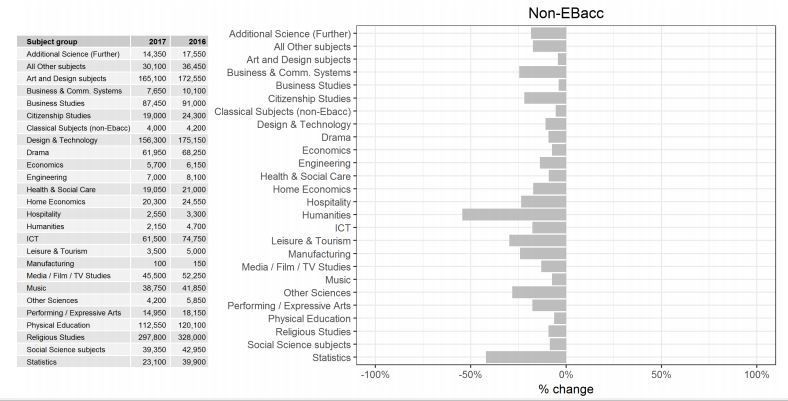Entries to EBacc subjects have increased by almost 10 per cent as entries to non-EBacc subjects have dropped.
In 2017, there were 3.85 million entries for the EBacc subjects, compared to 3.54 million last year, a rise of 9 per cent.
Meanwhile, the number of entries to subjects not included in the EBacc has fallen from 1.4 million in 2016 to 1.24 million this year, a fall of 11 per cent.
Overall GCSE entries in England have increased by more than 3 per cent this year.
Creative subjects, and others including business, hospitality and leisure and tourism have been particularly badly hit, the figures from Ofqual released this morning show.
The shift comes despite claims from schools minister Nick Gibb, one of the main architects of the EBacc, that creative subjects were not being hit by the new requirement on schools to deliver the performance measure.
The EBacc, first introduced in 2010, measures schools on the number of pupils who get a grade C or above across five core academic subjects: English, mathematics, history or geography, the sciences and a language. In 2016, 39.6 per cent of pupils took the EBacc subjects, compared to 23 per cent in 2012.
The non-EBacc subject to see the greatest fall in pupil entries overall was humanities, which combines several subjects, with a fall from 4,700 to 2,150 entries between 2016 and 2017.
Also experiencing a large drop was leisure and tourism, from 74,750 to 61,500.
Citizenship studies, which the Sutton Trust this week recommended should be rolled out more widely to state-school pupils, also fell from 91,000 to 87,450. Music also saw a drop, from 41,850 to 38,750.
Drama was also down from 68,250 entries to 61,950. Religious education saw a fall from 328,000 to 297,800, and art and design was down from 36,450 to 30,100.
Campaigners have argued that the absence of creative subjects within the EBacc measure will demote their status and have a negative long-term impact on the nation’s creative industries.
Geoff Barton, general secretary of the Association of School and College Leaders, warned that the “richness and diversity” of England’s education system is being “squeezed out by the effect of the accountability system and government under-funding of education.”
However, Gibb has said that claims the EBacc squeezes out the arts at GCSE are “quite simply wrong”. He pointed out that the percentage of state schools entered for at least one arts GCSE rose from 46 per cent to 50 per cent.
A consultation by the government on the accountability measure had originally set out plans to require schools to enter at least 90 per cent of pupils for the five subjects by 2020.
However, the Conservative manifesto released in May shows that the government will not expect to reach the 90 per cent target until 2025, and is settling for 75 per cent by 2022 instead.









Your thoughts